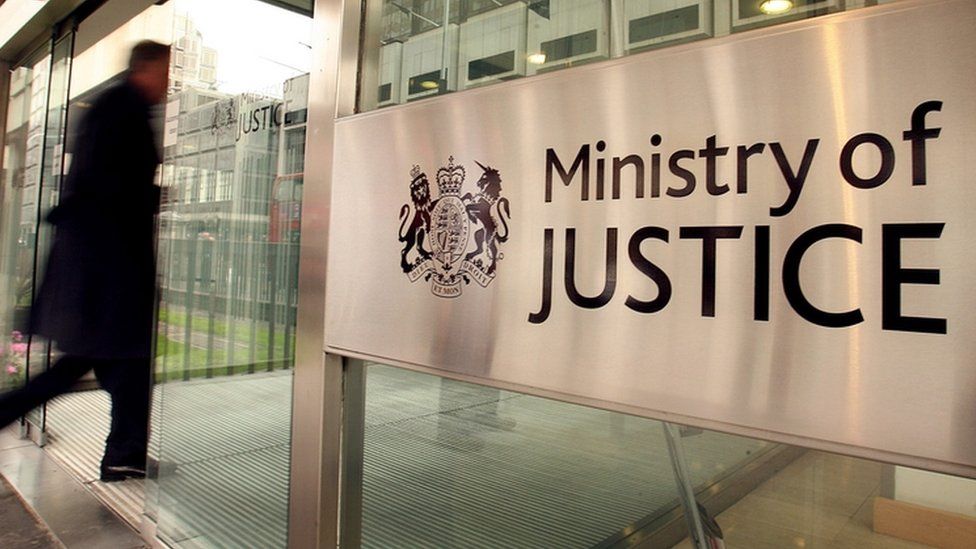MoJ used failed sex offender treatment 'unlawfully'
- Published

The Ministry of Justice acted "unlawfully" in allowing the Sex Offender Treatment Programme to continue for five years - despite initial research which suggested it wasn't working, a government analyst has said.
Kathryn Hopkins said she presented research in 2012 which showed the SOTP made sex offenders more harmful, but the programme wasn't halted until 2017.
Speaking to BBC News after bringing legal action in an employment tribunal, she estimated around 180 more crimes will be committed by sex offenders who were treated during the five years - compared with those who weren't.
But the MoJ said Ms Hopkins' research was "flawed".
A spokesperson said: "Ending the programmes with no proper evidence and no alternative would have meant letting sex offenders out of prison without treatment - a risk that no responsible Government could take. We stopped the programmes as soon as that evidence existed."
The department commissioned Ms Hopkins, who was a senior researcher in its analytics unit, to study the effects of the SOTP, which had been used in various formats since 1991.
The scheme involved group sessions and cognitive behavioural therapy and was designed to challenge the behaviour of male sex offenders with psychological techniques to change their thinking.
Treatment programmes for sex offenders
- Sex offenders can receive therapy in prison and in the community
- Core programme devised in 1992 - but revised over the years as evidence of effectiveness complex
- Main SOTP scheme rolled out to more prisons in 2000s - but now found to have failed
- Two new schemes have been accredited as replacements, having been devised from latest research
Ms Hopkins said her initial results suggested prisoners who took part in the scheme were more likely to reoffend than those who did not.
When the SOTP was eventually abandoned in 2017, the MoJ published a research report acknowledging that it was not working.
"The final report confirmed what the claimant [Ms Hopkins] had been saying all along, i.e. that there was a higher rate of reoffending by prisoners who had undertaken the SOTP," Employment Tribunal Judge Tamara Lewis declared.
"We can understand the claimant's frustration that it took five years to publish a report on such an important matter of public policy," she said.
Ms Hopkins said the MoJ had "allowed people to continue attending the course" while knowing "it could be harmful".
She indicated that victims and convicted perpetrators of sex attacks, who were told to complete SOTP, could sue the government if the crimes would otherwise not have taken place.
The MoJ explained the five-year gap between the original findings and the final report by saying that it had to check and revise the research that had been conducted.
"Both internal and external experts who reviewed Ms Hopkins' research judged that it was not of sufficient quality and that the methodology needed to be changed to remove the risk of bias and inaccurate results," a spokesperson said.
After the study confirmed the findings, the MoJ said it replaced the SOTP with two new programmes, Horizon and Kaizen.
Ms Hopkins suggested that, over an eight-year follow-up period, at least 178 more sexual offences would be committed by prisoners who'd been treated between 2012 and 2017 than by those who were not.
The figure is likely to be an under-estimate, she said, because it did not take account of the increasing number of sex offenders beginning the SOTP in those five years compared with earlier years.
According to MoJ statistics, 2,861 prisoners started the scheme.
The total also did not include sex offences that will not come to the attention of police, breaches of court orders and non-sexual offending.
The Employment Tribunal panel found that Ms Hopkins, who now works for HMRC, had been unfairly marked down in a performance review in 2014 because she'd raised concerns about the SOTP.
She was given a 'must improve' rating which Judge Lewis said "caused her enormous distress" and prompted her to start a grievance procedure.
The judge said: "It appears to us to be disproportionate and therefore very surprising that the claimant was marked 'must improve'."
However, the claim failed on a technicality because Ms Hopkins had waited too long to bring proceedings.
She said it was important to bring the case to ensure that other government research isn't "sidelined" or "covered-up", as she had alleged hers was.
She said: "It questions the integrity of those analysts' work if they're not supported to be independent and there's a possibility that government researchers will be perceived as not being independent from now on," she said.
The MoJ said: "Numerous internal and external experts who reviewed Ms Hopkins' research judged that it was not of sufficient quality and that the methodology needed to be changed."
It added the government stopped the programmes as soon as "proper evidence" existed.
- Published18 June 2019
- Published30 June 2017
- Published12 June 2019